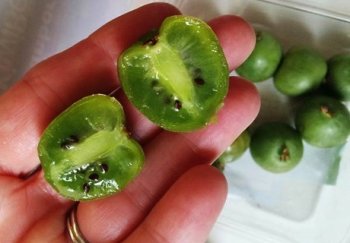
Kiwiberry production in Chile started in early February and will have finished on 20 March. Given that the main markets are Europe and the United States, the South American country's exports are not directly affected by China's veto to New Zealand’s production. Taking into account that the Chilean product is not yet authorised to enter China (although this could eventually change in the future), the NZ veto could offer opportunities in the Chinese market for Chilean kiwiberries.
Despite the fruit's qualities, kiwiberries have not yet managed to gain the position they are aiming for in the European market. "Demand from Europe has started very slow this year; however, US demand has increased compared to previous years. New Zealand remains our main competitor, as it produces almost at the same time as us," according to a statement by Chilean company, Core Export.
"Similarly, the United States produces in September and October, a time when we have no production. Therefore, we do not consider this country as a direct competitor; on the contrary, it is considered a market with great potential, but in order to increase our share in this market, we have to become efficient in upholding the necessary phytosanitary standards," adds Fresia Fuentes, a representative of Core Export.



 Classifieds
Classifieds

